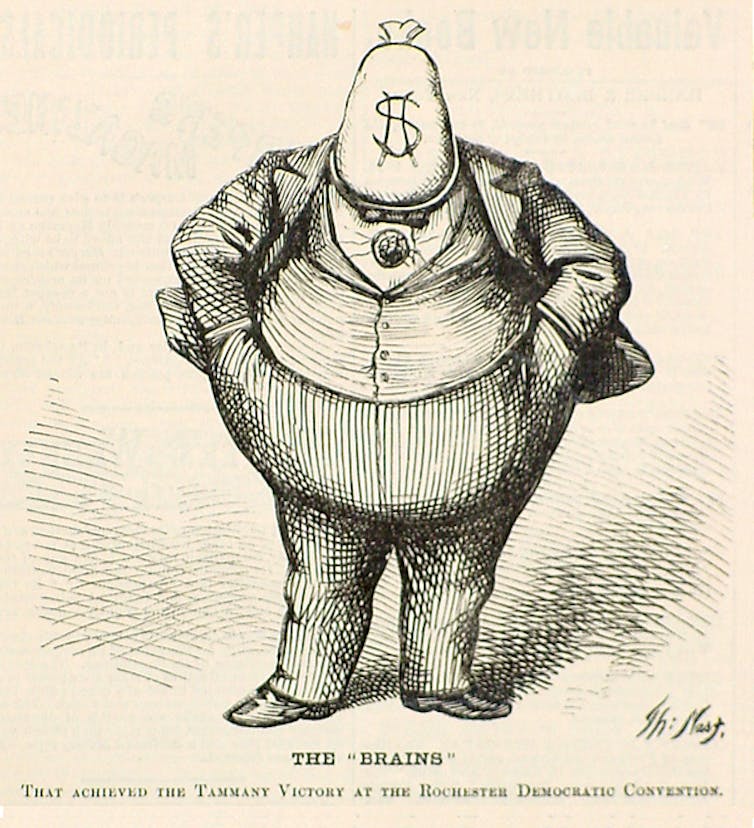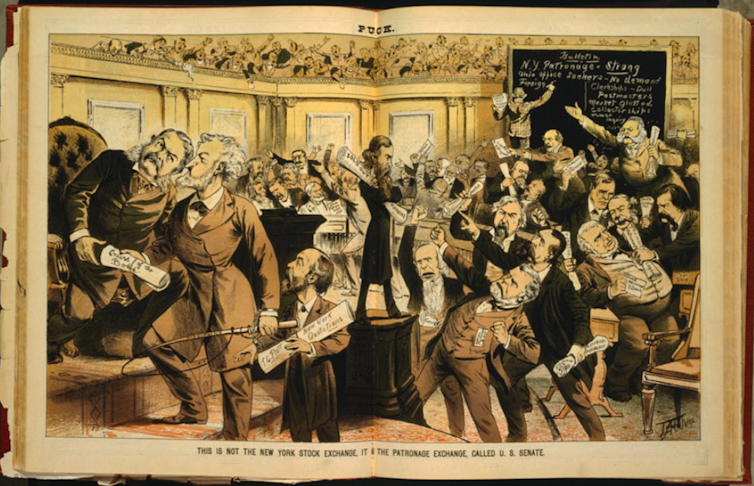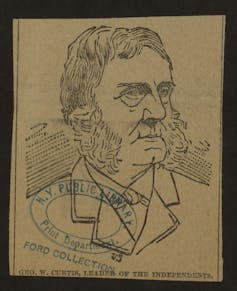Making money off of politics isn't new – it was business as usual in the Gilded Age
- Written by Jeff Broxmeyer, Assistant Professor of Political Science and Public Administration, University of Toledo
When the political leader “Boss” Tweed was arrested in New York on corruption charges in the fall of 1871, among his many assets was a luxury hotel.
Located up the road from City Hall, the Metropolitan[1] was a 400-room, five-story building described at its 1852 opening as a site that “fairly dazzles and bewilders the visitor, and causes him to think of the palaces of ‘Arabian Nights’ tales[2].” Tweed had acquired the hotel at the peak of his political power. He renovated the Italian Renaissance-style building at great expense, and he turned over management to his son[3], Richard.
The city’s elite patronized the hotel from day one, and it was the epicenter of business and politics in New York. Tweed held court there when managing public affairs[4] as the head of Tammany Hall[5], a powerful Democratic political machine.
His downfall[6], however, transformed the Metropolitan into an unlikely monument to scandal. Boss Tweed had bankrupted the city by embezzling funds while building himself a vast business empire[7].
Today, politics is again a place to make a fortune, at least for one prominent politician. Shortly before winning the 2016 election, Donald Trump celebrated the grand opening[8] of Trump International Hotel, down the street from the White House. In 2018 alone, the D.C. hotel generated US$40 million[9] in revenue by drawing heavily from a clientele with government business.
Unlike other modern presidents, Trump refuses to divest[10] from personal business, raising the question where the search for profit ends and his public service begins.
But if the situation appears new, it is hardly unprecedented.
 Boss Tweed, depicted by cartoonist Thomas Nast in Harper’s Weekly in 1871.
Wikipedia[11]
Boss Tweed, depicted by cartoonist Thomas Nast in Harper’s Weekly in 1871.
Wikipedia[11]
Party business
The Gilded Age[12], which lasted from the end of the Civil War to the turn of the 20th century, was a period when wealth flowed from success in politics.
Leaders in both parties became powerful and rich, building personal influence, crafting alliances, generating money and constructing the political machines necessary to win elections – all while serving in government.
When researching my upcoming book[13], “Electoral Capitalism: The Party System In New York’s Gilded Age,” I found political fortunes that were quite impressive. Politicians in New York and elsewhere made themselves into some of the country’s earliest millionaires.
During that period, what qualified individuals for party leadership was their ability to use the electoral system to finance a range of personal and political ventures.
For example, Tweed’s political ascent spawned an entire financial sector[14] owned and managed by Tammany Hall[15].
As state senator, he supported the legislative charter of new savings banks headed by himself and other Tammany politicians. The capital of these banks came from city funds which Tweed controlled from his seat on the Board of Audit[16], corporate donors looking for political favors, religious charities receiving public subsidies and immigrant workers, who were encouraged to deposit their earnings. These Tammany banks helped to make Tweed the third-largest landowner in New York City.
The banking house Morton, Bliss & Company was built upon marketing U.S. government debt, a lucrative privilege secured by party connections in the Grant administration. Levi P. Morton[17] then used his private firm[18] to manage the personal finances of the day’s most influential Republicans, from Roscoe Conkling to James Blaine, before becoming himself a congressman, vice president and governor.
Morton’s firm sold U.S. debt in every administration from the 1870s onward, with the exception of the Democratic President Grover Cleveland, before selling to J.P. Morgan in 1909[19]. Morton went into retirement as one of the wealthiest men of the day.
 1881 cartoon, ‘This is not the New York Stock Exchange, it is the patronage exchange, called U.S. Senate.’ Roscoe Conkling and Thomas Platt are to the right of Chester Arthur, who was president.
Library of Congress, J.A. Wales artist[20]
1881 cartoon, ‘This is not the New York Stock Exchange, it is the patronage exchange, called U.S. Senate.’ Roscoe Conkling and Thomas Platt are to the right of Chester Arthur, who was president.
Library of Congress, J.A. Wales artist[20]
Gilded democracy
The politicans’ newfound wealth – mansions on Fifth Avenue or buying race tracks – generated a public outcry over the so-called “bogus aristocracy.”
In language common among working-class reformers, “John Swinton’s Paper” called upon voters to “up and cleanse” public office of the “filthy slugs, roaches, and bloated spiders that fatten on the stealings”[21] from taxpayer money and corporate lobbies.
Where did the public till end and the private purse begin? It was not so clear. Virtually no laws, state or federal, existed to prevent self-dealing or embezzlement.
Private property was often treated as sacrosanct, however acquired, and politicians were skilled in making arguments about their fortune’s legitimacy. Fernando Wood became a millionaire by flipping public land during his several mayoral terms. Yet, throughout a long career Wood maintained he was a respectable “merchant[22].” Critics questioned his reputation, but they could do little else.
Personal enrichment was encouraged through public office-holding because profits fueled party politics. Then, as now, elections were expensive. Party committees were always in need of cash infusions. Few questions were asked about the origins of donated funds.
This period was also the spoils system’s heyday[23], when parties rewarded their supporters by giving them jobs and contracts.
Thomas Platt[24] climbed the party ladder to the presidency of the U.S. Express Company[25] by securing it generous federal subsidies as a congressman. Platt’s family took advantage[26] of sweetheart company loans and paid themselves huge salaries.
 Reformer George William Curtis.
New York Public Library[27]
Reformer George William Curtis.
New York Public Library[27]
An old question now
Is politics a legitimate way to become wealthy? Historical debates help to consider the role of money in politics today.
During the 19th century’s final decades, mass movements of farmers and laborers protested[28] loudly against the growing wealth of politicians, as living conditions for them worsened.
Reformers from across the political spectrum believed the sudden growth of political fortunes was part of the problem – a “conspiracy of officeholders” is what George William Curtis[29], head of the Civil Service Reform Association, called it.
Still, no easy consensus was reached on the proper remedy.
Where reformers did agree was in the view that democracy was more than just another place to do business. Otherwise, competition shifts among politicians from a struggle for votes to a scramble over dollars, and the only policies advanced are those that line the pockets of party leaders and their patrons.
[ Expertise in your inbox. Sign up for The Conversation’s newsletter and get a digest of academic takes on today’s news, every day.[30] ]
References
- ^ Metropolitan (digitalcollections.nypl.org)
- ^ fairly dazzles and bewilders the visitor, and causes him to think of the palaces of ‘Arabian Nights’ tales (chroniclingamerica.loc.gov)
- ^ he turned over management to his son (books.google.com)
- ^ managing public affairs (www.gothamcenter.org)
- ^ Tammany Hall (books.google.com)
- ^ downfall (southwestcollection.wordpress.com)
- ^ vast business empire (doi.org)
- ^ grand opening (www.c-span.org)
- ^ US$40 million (oge.app.box.com)
- ^ refuses to divest (www.reuters.com)
- ^ Wikipedia (en.wikipedia.org)
- ^ Gilded Age (www.americanyawp.com)
- ^ upcoming book (jeffbroxmeyer.com)
- ^ spawned an entire financial sector (doi.org)
- ^ Tammany Hall (digitalcollections.nypl.org)
- ^ Tweed controlled from his seat on the Board of Audit (www.biography.com)
- ^ Levi P. Morton (digitalcollections.nypl.org)
- ^ private firm (books.google.com)
- ^ selling to J.P. Morgan in 1909 (www.senate.gov)
- ^ Library of Congress, J.A. Wales artist (www.loc.gov)
- ^ “filthy slugs, roaches, and bloated spiders that fatten on the stealings” (books.google.com)
- ^ maintained he was a respectable “merchant (academicworks.cuny.edu)
- ^ spoils system’s heyday (catalog.hathitrust.org)
- ^ Thomas Platt (digitalcollections.nypl.org)
- ^ U.S. Express Company (drc.ohiolink.edu)
- ^ took advantage (timesmachine.nytimes.com)
- ^ New York Public Library (digitalcollections.nypl.org)
- ^ farmers and laborers protested (books.google.com)
- ^ George William Curtis (digitalcollections.nypl.org)
- ^ Expertise in your inbox. Sign up for The Conversation’s newsletter and get a digest of academic takes on today’s news, every day. (theconversation.com)
Authors: Jeff Broxmeyer, Assistant Professor of Political Science and Public Administration, University of Toledo

